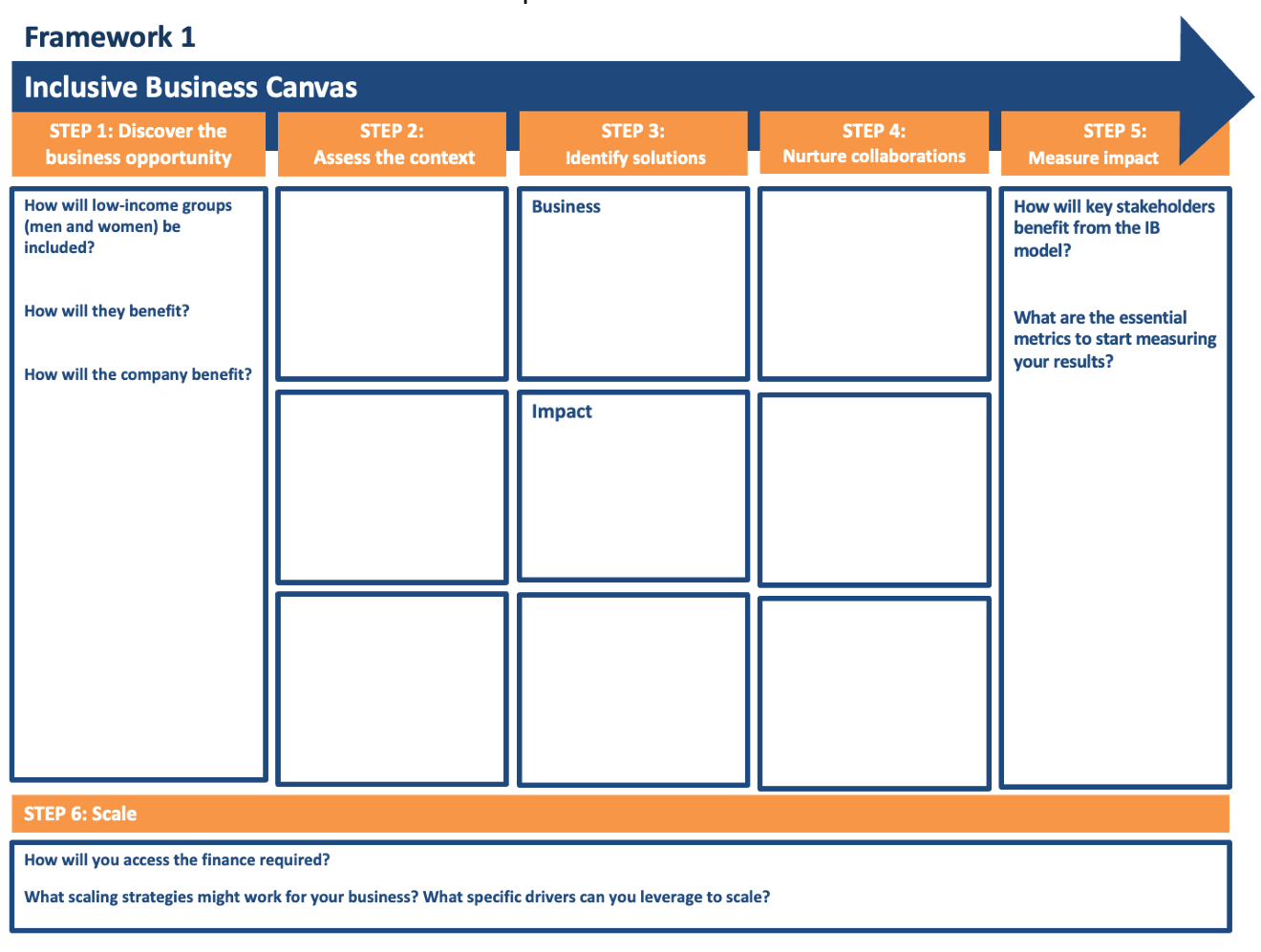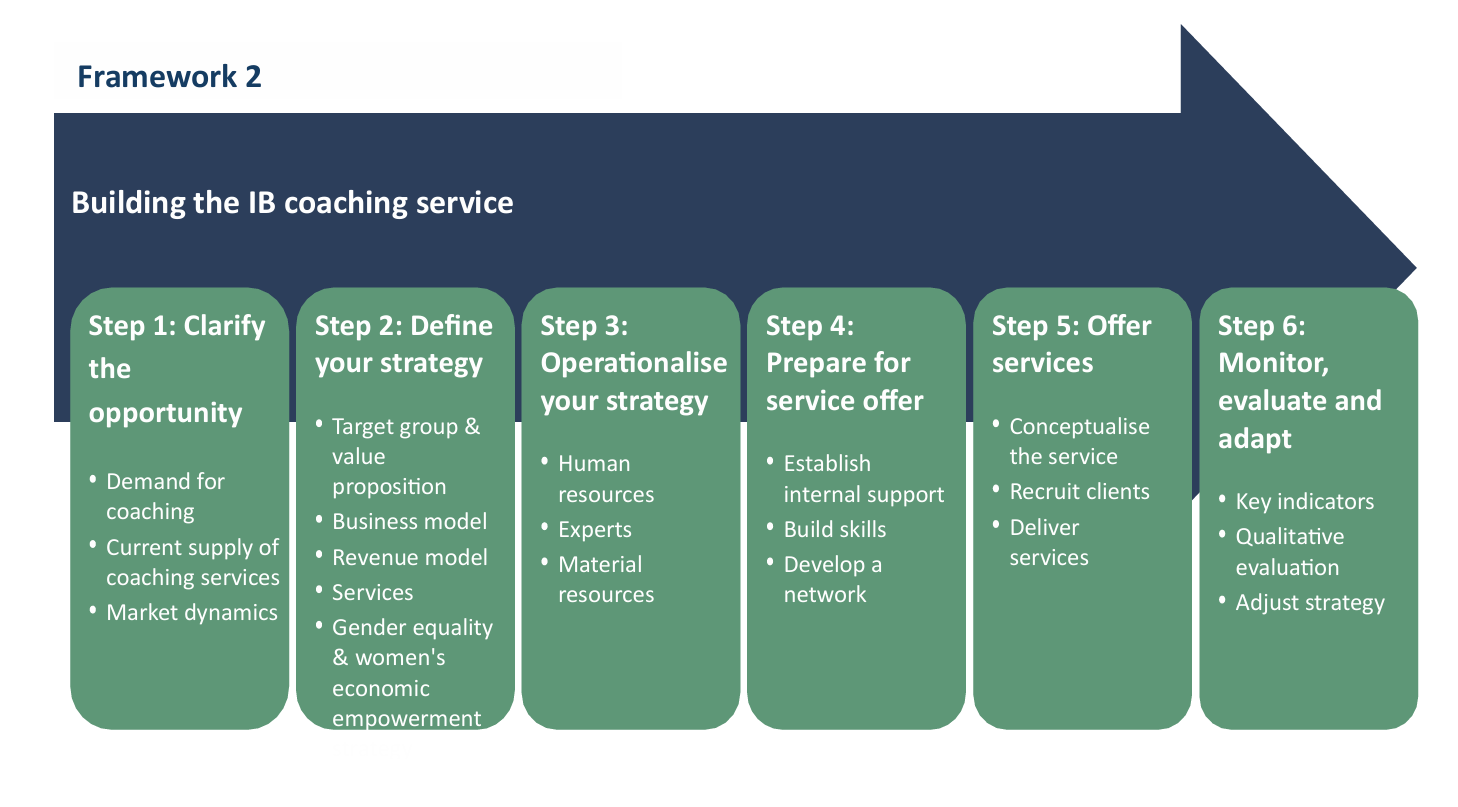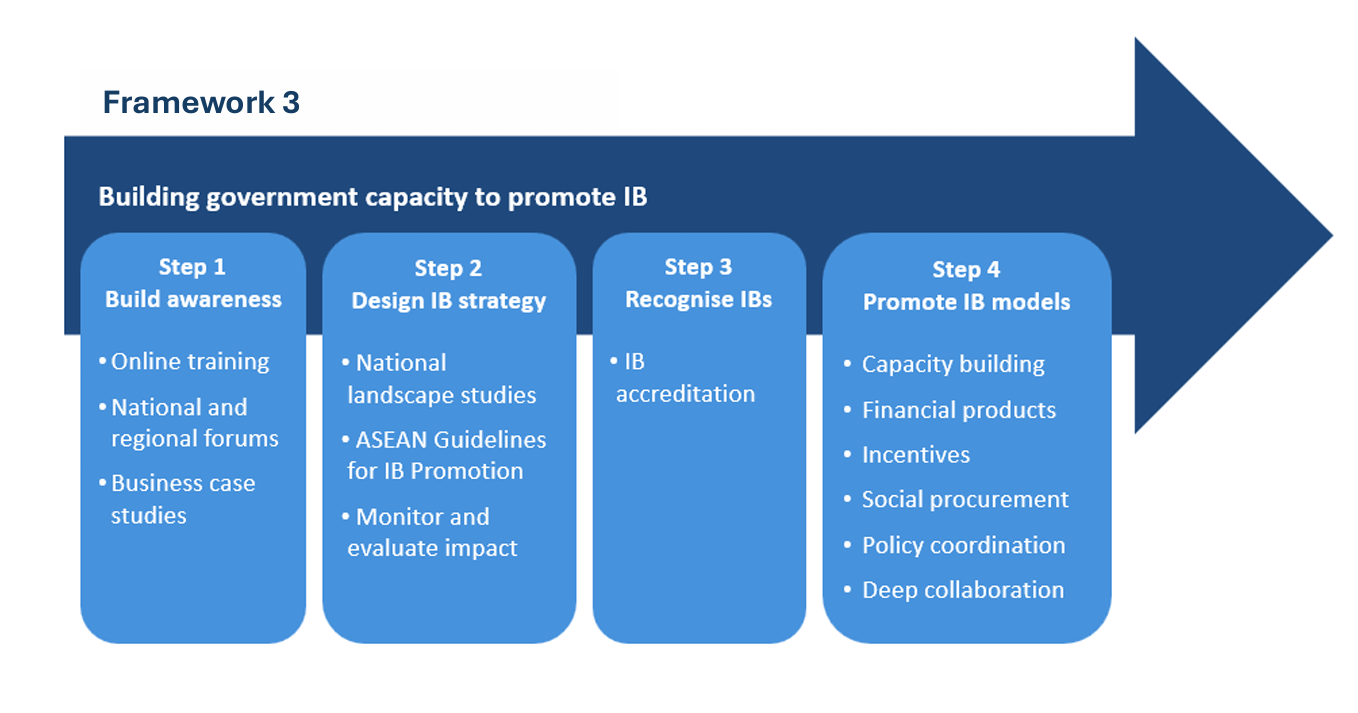Executive Summary
The objective of this framework is to guide the ASEAN Member States, particularly ministries responsible for small and medium enterprise (SME) development and SME development agencies, in enhancing the capacities of businesses to develop inclusive business (IB) models and to cultivate talent that can support inclusive businesses.
The framework, based on the Guidelines for the Promotion of Inclusive Business in ASEAN, and the experiences of ASEAN Member States and other countries, is a useful source of information for businesses, entrepreneurs, government officials, trainers, and business support organisations seeking to promote businesses that go beyond profit and create positive social impact.
Chapter 1 of the report examines the key capacities and talents that need to be nurtured to promote inclusive business. It is not a training manual, but it provides a framework of capacities and skills that are required for building IB models, and pinpoints key tools and resources available to support capacity development. The section is further divided into three sections.
Section 1 explores the skills required by businesses to build IB models. Framework 1, The Inclusive Business Canvas, provides the reference tool for businesses to design inclusive business models. It introduces the six steps for developing IB models, along with the tools that can be used in each step.

Section 2 explores the skills required by business organisations to support businesses in developing IB models. Enterprises seeking to develop an inclusive business model are likely to require specialised support. Therefore, to support inclusive business models, business support organisations (from incubators and accelerators to SME development agencies) must be able to provide specialised IB services. While some business support organisations may already be providing some IB services, others are not. Organisations planning to offer IB coaching services can start by devising a strategy. Framework 2, Building the IB Coaching Service, provides an overview of the six steps to developing such a strategy.

Section 3 explores the skills governments need to support IB models. Key indicators Qualitative evaluation Adjust strategy Governments play a vital role in enabling inclusive businesses to grow and scale their impact. This is because, while inclusive businesses have innovated and developed viable models for success, market conditions at the base of the economic pyramid can be challenging. Framework 3, Building Government Capacity to Promote IB, provides an overview of the different capabilities that governments may require.

Chapter 2 of the report highlights a wide range of approaches that can be used to strengthen IB capacities and nurture talent, spanning from online training to personalised coaching programmes, policy advisory services, and matchmaking activities.
This chapter also presents good practices for building capabilities and developing talent in IB. Drawing on the experience and evaluations of previous programmes, it notes the importance of:
- Combining training with access to finance;
- Going beyond offering basic training by providing personalised coaching;
-Building partnerships by working in cohorts and leveraging public-private collaboration;
-Designing programmes based on, and offering, market opportunities;
-Developing not just the skills of businesses but also institutional and ecosystem capacity;
-Providing incentives for businesses to participate and take action; and
-Monitoring and learning from such programmes.
Finally, Chapter 3 provides guidance for governments on how to develop a national strategy for building IB capacities.
In addition, it suggests actions that could be taken at the regional level to support ASEAN Member States in their IB capacity building and talent development.
Recognising that regional collaboration on capacity building is essential for accelerating inclusive business growth and fostering sustainable private sector development, this chapter proposes a Regional Roadmap for Inclusive Business Capacity Building and Talent Development in ASEAN. The roadmap would leverage synergies and strengthen national ecosystems through strategic collaboration and includes the following actions:
- Establish an ASEAN IB Capacity Building Network to guide this work, comprising designated national focal points for IB capacity development and a few experts, who convene annually during the ASEAN IB Forum.
- Launch ASEAN IB training programmes for experts, business support organisations and government officials.
- Set up an ASEAN IB mentoring network to facilitate business-to-business learning and mentoring between experienced inclusive businesses and emerging enterprises.
- Maintain a regional inventory of resources.
- Link capacity building with other ASEAN IB promotion mechanisms.
To implement these actions, it will be critical to identify resources, including a regional ASEAN programme and ensure that ASEAN Member States contribute to such efforts.
Introduction
Purpose
The objective of this framework is to guide ASEAN Member States, particularly ministries responsible for SME development and SME development agencies, in strengthening the capacities of businesses to develop inclusive business (IB) models and to develop talent that can support inclusive businesses.
In addition, the framework is a useful source of information for businesses, entrepreneurs, trainers and business support organisations seeking to promote businesses that go beyond profit and create positive social impact.
The framework will serve as a model for ASEAN Member States to use as a reference when supporting capacity building and talent development for inclusive businesses. The framework can be adapted to national contexts. Customisation is essential to ensure that the capacity building system aligns with each country's unique socio-economic realities, national priorities, institutional features, financial resources and regulatory frameworks.
Methodology
The framework is based on the Guidelines for the Promotion of Inclusive Business in ASEAN, as well as on the experiences of ASEAN Member States and other countries in developing support systems for businesses to cultivate inclusive business models.
The framework distils the key capacities and talent that need to be nurtured to promote inclusive business. Although it is not a training manual, it provides an outline of the capacities and talents required to support capacity development and pinpoints key tools and available resources. It also identifies approaches and good practices for developing capacity-building programmes. Finally, the framework provides suggestions on developing an IB capacity-building strategy at the national and regional levels.
The report is organised in three parts:
1. Capacities and talents required for building IB models: This section identifies the capacities needed by businesses, business support organisations and government officials to cultivate inclusive business models. It also provides essential tools and links to available resources to support capacity development.
2. Approaches and practices for IB capacity building and talent development: This section identifies a wide range of strategies that can be used to build IB capacities and develop talent.
3. IB capacity-building strategy and governance: This section provides guidance for governments on how to develop a national strategy for building IB capacities. In addition, it suggests actions that can be taken at the regional level to support ASEAN Member States in their IB capacity building and talent development.
This framework does not address general business capacity development or conventional management training, as these areas are already well established. Instead, it focuses on equipping businesses with the specific capabilities required to design and implement inclusive business models that create social impact while remaining commercially viable.
Key concepts of inclusive business
Inclusive businesses (IBs) provide goods, services and livelihoods on a commercially viable basis, either at scale or scalable, to people living at the base of the economic pyramid (BoP), making them part of the value chain of companies’ core business as suppliers, distributors, retailers or customers.
IBs can be found across all sectors and operate a broad range of business models, but they share some common features:
1. They engage intentionally with people at the BoP: Engagement seeks to generate net positive social impact, such as improved livelihood opportunities, increased income or better access to relevant and affordable goods and services.
2. They pursue financial viability: The inclusive activity is underpinned by a functioning business model designed to be sustained over the long term. BoP stakeholders are viewed as business partners and/or valued customers, rather than beneficiaries.
3. They have scale or are scalable: The model grows its business operations and its social impact.
4. They are innovative: Working at the BoP necessitates innovation to reduce risk and generate profit while being impactful.
5. They measure and manage their impact: Businesses can track and demonstrate their impact on the BoP and can grow and adapt accordingly.
The IB models deliver solutions to the BoP through two key modalities:
• Providing goods and services to the BoP that are relevant to overcoming poverty (and thus involve them as consumers); or
• Creating income opportunities for the BoP to bring them out of poverty; or substantially improve their economic status, and engage them as suppliers (e.g. in agribusiness and tourism), labourers (in manufacturing), distributors (in trading) or shareholders.
Why does it make good business sense to venture into the low-income market?
- Building new markets: The BoP4 represents a large market, but it often remains untapped by formal businesses5. Companies that venture into this market can find new growth opportunities.
- Strengthening supply chains: On the supply side, localising and diversifying supply chains is a priority for increasing resilience and reliability. Sourcing from smallholder farmers or local artisans can improve product quality and produce goods with higher value-added such as fair trade or organic products.
- Generating returns: Two decades of experience show that businesses serving the low income markets can be profitable and scalable.
- Demonstrating company purpose: The inclusive business approach is a way to manifest the company's purpose with tangible actions, especially for large companies. Directly contributing to poverty alleviation and improving people’s lives can be a motivating factor for employees, as well as customers and business partners.
- Driving innovation: Operating in urban slums and rural villages can spark innovations that can also be applied across various markets. A well-known example is M-PESA, which started as a solution for low-income people in Kenya to transfer money to their families back in their villages, and has scaled into a global phenomenon and profit driver for Safaricom.
Why does it make sense for governments to promote inclusive businesses?
Inclusive businesses have the potential to:
- Create income and economic opportunities in low-income communities. Besides creating jobs, inclusive businesses engage with people as producers, entrepreneurs and business partners. In agribusiness, for example, they support smallholder farmers with training, inputs, and access to finance and technology, which allows them to increase yields and establish market linkages, often for better prices.
- Empower women by creating jobs and entrepreneurship opportunities tailored for women and that cater to women’s needs. Such models can support gender equality and enable women to combine economic opportunities with their other tasks and roles.
- Provide access to basic goods and services, including healthcare, education, energy, water and sanitation, and therefore support the government in the delivery of these services. The off-grid solutions used by inclusive businesses provide low-income urban and rural communities with reliable energy, safe water, and sanitation. Access to low-cost education and health services often leverages local entrepreneurs and digital solutions.
- Drive innovation and entrepreneurship. To reach the BoP, companies must innovate and increase the relevance of their new product or service. Many inclusive businesses also seek to improve environmental sustainability (by enhancing natural resource use efficiency and reducing waste), and/or to facilitate access to finance and financial inclusion.
Click to read more